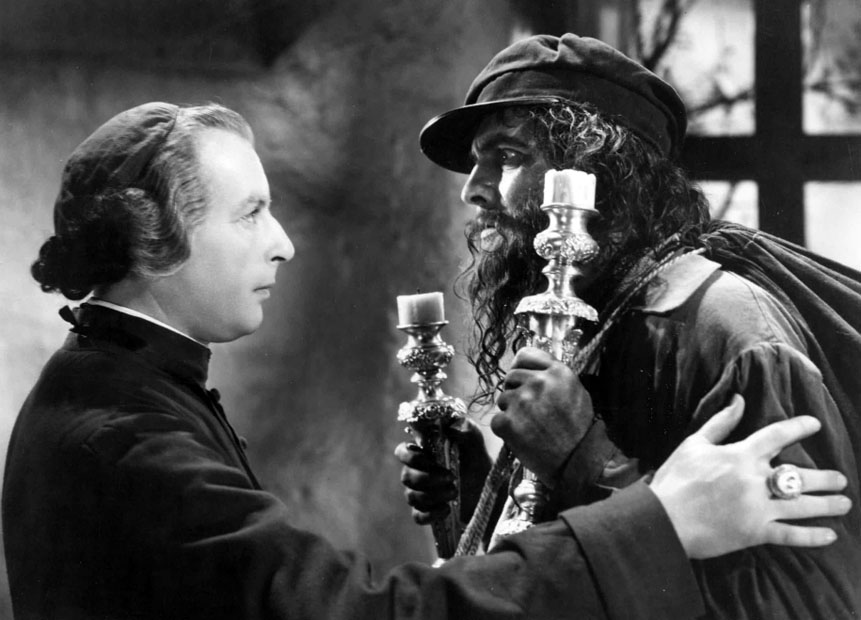Les Misérables Chapter-a-Day Read-along Discussion: The Fall

Fredric March and Cedric Hardwicke in Les Misérables (1935)
I’m a little short on time this week, so for week four’s post in the Les Misérables Chapter-a-Day Read-along, I’m going to simply pose a question in the hopes of starting a discussion. This is an honest question I have, a question to which I do not have a definitive answer. As we try to answer it, I ask that we stick only to the events of Book One and Book Two out of courtesy to those who are reading Les Misérables for the first time.
So here’s my question:
Victor Hugo called Book One “A Good Man” or “An Upright Man” or “A Just Man.” It was pretty clear that he was referring to the Bishop of Digne. But the title of Book Two is “The Fall.” What does that refer to? It’s October, but it doesn’t appear that “The Fall” refers to the season of autumn. “The Fall” is also shorthand for Adam and Eve succumbing to temptation in the Garden of Eden. Is that connected somehow with the events of this section?
What do you think? Why is Book Two called “The Fall”? Leave your thoughts in the comments.
Do you have any questions about these first two books? Feel free to ask. And, as always, we’d love to hear anything you have to say about the book so far, or your experience reading it.
































What a great question! I don’t think I would normally pay too much attention to the chapter titles.
Since I have never read the book before, I can only contemplate this question in terms of the first two books of the novel. I think “The Fall” must refer to Jean Valjean’s original crime, through his subsequent imprisonment, escapes, his succumbing temptation in the home of Monseigneur Bienveue all the way up to the incident with the boy Petit Gervais which is the true turning point for Valjean, or (what I suspect) will be the reversal of his plunge in to darkness, before it is too late and he is no longer redeemable.
I’d never thought of your seasonal reference, but then I use autumn! Although it fits with American usage, the French use l’automne, more like English usage. For me The Fall is that of Jean Valjean. He does succumb to temptation when stealing the bishops silver, but he doesn’t need the 40 sous from Petit Gervais. We know he has money (I did think it interesting that the convicts made money from their toils), and he doesn’t need to rob a child. To me The Fall is JVJ hitting rock bottom, and robbing a child when he doesn’t need to, he doesn’t even plan to, he just does it for no particular reason, because he can.
I could see this if Monseigneur Bienvenu’s blessing of JVJ is treated like God placing Adam in the Garden of Eden. In that case, the Fall absolutely was stealing Petit Gervais’s coin.
I’ve been taking the Fall to refer to Jean Valjean, like Louise and Ruthiella say. In chapter 13 of the Fall, “It seemed to [Jean Valjean] that he was looking at Satan by the light of Paradise.” I differ in that I think his Fall was realizing what he was and what he was doing. Yes, he looked back on his first crime, but he reviewed everything that he had done that was wrong. If the Fall in some way requires mankind to accept guilt for something, Jean Valjean finally saw and accepted the guilt of stealing, especially for reasons that were not desperation. He saw who he had become more than nineteen years after stealing bread for his family. And it upset him.
Great insight, Carrie. I hadn’t noticed that Jean Valjean has finally committed an evil act for which he had no reason or need. Like Adam and Eve, he is now convicted by his new knowledge and understanding of himself.
I find it interesting that Hugo calls it “The Fall,” when Valjean already seems to have fallen. On the surface Valjean looks like a fallen man, a convict. But following up on Carrie’s comment, the real or interior “fall” takes place after he steals from Petit Gervais and realizes what he has become: “…in his eyes the bishop grew in stature and brilliance while Jean Valjean shrank and faded. There came a point when he was no more than a shadow. All of a sudden he vanished. The bishop alone remained. He filled this wretched man’s soul with a magnificent radiance.”
In other words, and more briefly, maybe the “The Fall” refers to Valjean falling to his knees in front of the bishop’s front door.
The Fall is the moment that the reader is waiting for.
Hugo uses the silver as a temptation that Valjean cannot resist.
This type of ‘mini-turning’ point pushes the action further
….and gives the reader an ‘ah-ha’ moment when he/she thinks
….yes, I know what temptation feel like….one empathizes with Valjean.
This is one of those moments where translation choices come into play. My Rose translation calls this book The Fall, but Denny calls it The Outcast. I’m curious to know what the original says and it’s meaning now….
Hi Brona,
The original French is “La chute” which would translate as “the fall” or “the slide”. So it is more curious that Denny opted to go with The Outcast I think.